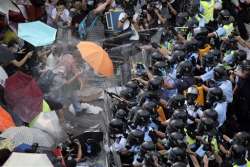Under-fire Hong Kong leader marks National Day
Hong Kong: Hong Kong's embattled leader attended a flag-raising ceremony on Wednesday to mark China's National Day after refusing to meet pro-democracy demonstrators despite their threats to expand the street protests that have posed the

Hong Kong: Hong Kong's embattled leader attended a flag-raising ceremony on Wednesday to mark China's National Day after refusing to meet pro-democracy demonstrators despite their threats to expand the street protests that have posed the stiffest challenge to Beijing's authority since China took control of the former British colony in 1997.
Hong Kong Chief Executive Leung Chun-ying took part in the ceremony—marking the anniversary of the founding of communist China in 1949 -- as thousands of protesters watching from behind police barricades yelled at him to step down.
China took control of Hong Kong under an arrangement that guaranteed its 7 million people semi-autonomy, Western-style civil liberties and eventual democratic freedoms that are denied to Chinese living on the communist-ruled mainland.
The protesters want a reversal of a recent decision by China's government to screen all candidates in the territory's first direct elections, scheduled for 2017 -- a move they view as reneging on a promise that the chief executive will be chosen through “universal suffrage.”
The growing protests have attracted worldwide attention, with British Prime Minister David Cameron saying he planned to summon the Chinese ambassador to discuss the dispute, saying it is essential that Hong Kong's people have a genuine right to choose their top leader.
“It is not for us to involve ourselves in every dot and comma of what the Chinese set out,” Cameron said in England. But he added: “I think it is a critical question. Real universal suffrage doesn't just mean the act of voting; it means a proper choice.”
Leung's rejection of the student demands dashed hopes for a quick resolution of the five-day standoff that has blocked city streets and forced some schools and offices to close.
Despite the hardening rhetoric from both sides, Tuesday night passed with a festive mood and few police were evident, but the crowds and road blockages are expected to grow sharply as Wednesday and Thursday are public holidays.
“Frankly, if I was a government official, I would not have a clue how to solve this,” said Chit Lau, a 35-year-old pilot.
He thought the stalemate would continue until Leung or some other top official resigned, or the army clashed with the people, adding: “This is a test of Hong Kong people's endurance of a peaceful act of requesting democracy, and so far the citizens have demonstrated a united spirit and discipline.”
It was not clear what the demonstrators planned to do next. There were no immediate speeches or official statements from the protesters, who chanted “Jiayou! Jiayou!”—“Keep it up!”—while waving their cellphone flashlights in the dark.
Earlier Tuesday, Alex Chow, secretary general of the Hong Kong Federation of Students, the organizer of the university class boycotts that led to the street protests, said the students were considering various options if their demands were not met, including widening the protests, pushing for a labor strike and occupying a government building.
Chinese President Xi Jinping, who has taken a hard line against any perceived threat to the Communist Party's hold on power, vowed in a National Day speech to “steadfastly safeguard” Hong Kong's prosperity and stability.
China's government has condemned the student-led protests as illegal, though so far it has not overtly intervened, leaving Hong Kong authorities to handle the crisis. Over the weekend, police fired tear gas and pepper spray in an attempt to disperse the protesters, but the demonstrations only spread.
Protester Esther Koo, a 30-year-old social worker, said she was worried about what the government might be planning to do after National Day was over.
“Maybe they are planning something to happen even worse than what happened with the tear gas,” she said.